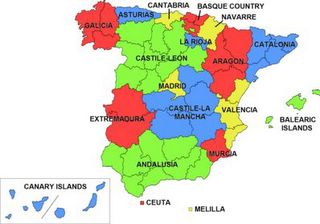* Back in Basque Country

"Basque" refers both to a language and to the roughly 1 million people who speak it (though the people themselves call their language "Euskara"). Linguistically, Basque is one of Europe's greatest mysteries--it doesn't appear to be related to any other recorded language, living or dead.
The Basque homeland covers an area of northern Spain and southwestern France roughly the size of New Jersey, bordered by the Pyrenees Mountains, the Bay of Biscay, and the Ebro River. It's mountainous territory, which is probably the source of the language's longevity.
The Basques' ancestors arrived in the area thousands of years ago. They survived subsequent invasions--by the Celts, Romans, Visigoths, Franks, Normans, and Moors--in part because their territory was so inhospitable. In the medieval period, the Basques enjoyed considerable autonomy under various local kingdoms. But there has never been a Basque nation that united all Basque speakers under a single flag--a fact that still bothers Basque nationalists.
Basque Nationalism
Basque nationalism got its formal start in 1895, when Sabino de Arana formed the PNV (Partido Nacionalista Vasco, or "Basque National Party"). The PNV was dedicated to the formation of an independent Basque nation through peaceful means. The organization gradually began to win seats in local governments, and their demands were soon heard in Madrid. The Spanish government was not willing to discuss outright autonomy for the Basque region, but it was willing to allow limited self-government.
That situation changed in the early 20th century, when politics in Spain took a sharp rightward turn, culminating in the Spanish Civil War and the fascist dictatorship of Generalissimo Francisco Franco. The new government had no sympathy for anyone not dedicated to Spanish unity. It responded to calls for Basque independence with mass arrests, torture, and even assassination squads. Franco outlawed the Basque language, and the Basque nationalist cause went underground, where it eventually took on a new and terrifying shape.
Enter the ETA
In 1959, a new party arrived on the Basque political scene: ETA (Euskadi Ta Askatasuna, or "Basque Homeland and Liberty"). ETA's young, socialist leaders were frustrated by the slow pace of change and increasingly turned to violence and terror in pursuit of Basque independence. Since its inception, ETA has been blamed for more than 800 deaths, many by bombing. In 1973, an ETA bomb killed Admiral Luis Carrero Blanco, Franco's heir-apparent.
In 1975, Franco died and Spain moved toward democratic government. A few years later, Spain adopted a constitution that granted limited autonomy to the Basque region, including control over education, health care, police, and taxation. Democratic reforms eroded popular support for violent resistance, and ETA responded by forming a political arm (Herri Batasuna, or "People Unity").
Still, ETA also stepped up the frequency of its attacks. Except for a ceasefire in 1998-99, the violence has not stopped, and continuing bloodshed led the Spanish Supreme Court to declare ETA's political arm illegal. Many now think ETA is as weak as it has ever been and could be on the verge of declaring another ceasefire. In the meantime, Basque separatists remain prime suspects whenever a bomb goes off in Spain.
Mark Diller
July 12, 2005



3 Comments:
Good post Mark.
Only one thing regarding this paragraph:
"But there has never been a Basque nation that united all Basque speakers under a single flag--a fact that still bothers Basque nationalists."
Navarra is widely known as the Basque Kingdom of Navarre. The Basque did have an unified political entity to call home for little over 800 years.
The fierce war between 1492 and 1521 waged by the Kingdoms of Castile and Aragon to seize Navarre is indicative that the Basques wanted nothing to do with their neighbors.
Couple of years later France conquered Basse Navarre thus depriving the Basques from an independent land.
The myth that there was never a Basque political entity is something that Madrid and Paris came up with in recent years.
This comment has been removed by a blog administrator.
blex,
Thank you for the comment. I had actually come across this article [written by Mark Diller] on the
net, and found it most intriguing so I decided to include it in the blog. I am ever the learner, so I am very interested in such snippets of information that don't normally come my way. In much the same way that you alluded to the Madrid-Paris conspiracy, I think a lot of History may have been altered to suit the
powers that be who reigned at the time.
Again, thank you for your comment. It was duly noted =)
aria
Post a Comment
<< Home